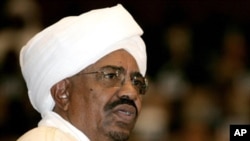Just weeks after soundly defeating all challengers in a controversial election, Sudanese President Omar al-Bashir has been sworn in for a new term. The inauguration was also not without controversy.
President Bashir was sworn in for a five-year term in the Sudanese parliament, after an election marred by boycotts and allegations of fraud.
But opposition groups raised concerns of electoral fraud before the first vote was cast and massive logistical errors caused confusion at the ballot boxes. The election was supposed to be an internationally-recognized and resounding victory for the largely unchallenged president. But election monitors said the vote fell short of meeting international standards for a free and fair vote.
Organizations such as the International Crisis Group reported that Mr. Bashir's National Congress Party suppressed dissent before the election. Since President Bashir's victory, the crackdown on Sudanese opposition has intensified.
Two weeks ago, Sudanese authorities arrested four members of Khartoum's opposition newspaper Rai Al-Shaab and accused them of trying to destabilize the government. A day earlier, authorities detained the Rai Al-Shaab's owner and opposition leader Hassan Al-Turabi under similar charges.
On May 26, Paris-based Reporters Without Borders reported the detained journalists had been beaten in prison and released photographs of their injuries. The head of the group's Africa Desk, Ambroise Pierre, dismissed the allegations against the journalists and said the arrests were made to silence them.
"This is an accusation that is often used by governments that do not tolerate opposition. These people are journalists from an opposition daily. What they are doing is openly criticizing the government. Obviously, we can see that President al-Bashir wants to be sworn in without any criticizing voice being tolerated in the country," said Ambroise Pierre.
President Bashir is wanted by the International Criminal Court on charges of war crimes committed in Darfur. The tactics employed by Mr. Bashir's forces in the battle against Darfur rebels eventually led to the 2008 ICC indictment, making him the first sitting head of state to be charged by the International Criminal Court.
Organizations such as London-based Amnesty International and New York-based Human Rights Watch called for a global boycott of his inauguration.
Speaking before the ceremony, international justice advocate for Human Rights Watch Geraldine Mattioli said the presence of the international community could provide legitimacy to Mr. Bashir's rule.
"No legitimacy should be [lent] to President Bashir," she said. "He stays a wanted war criminal and this is part of why we are urging for the ceremony to be boycotted. The arrest warrant of the International Criminal Court could have positive side effects in marginalizing President Bashir, but this is only going to happen if it receives backing from the international community."
Despite those appeals, the event was attended by the presidents of Ethiopia, Chad, Malawi, Mauritania, and Djibouti as well as senior officials from the United Nations.
Mr. Bashir's inauguration takes place as the international community gathers for the first-ever Review Conference of the Rome Statute next week in Uganda. The participating states will attempt to strengthen the mandate of the International Criminal Court, but many worry President Bashir's election could weaken international commitment.
It is unclear how Mr. Bashir's extended rule will affect Southern Sudan, which is widely expected to opt for independence through a referendum in January. President Bashir has stated he would accept the South's decision, but many crucial issues, such as border demarcation and oil revenue distribution, have yet to be resolved.
Sudan's Bashir Sworn In to Another 5-Year Term












